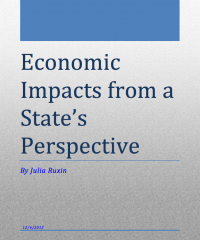Julia Ruxin

Environmental Studies 2014
Research Paper:
Paper Subheadings:

Introduction:
The process of hydraulic fracturing has been a controversial topic of discussion for a few years. Scientists, activists, politicians, and citizens alike talk in circles over the issue. One major component of these discussions is the economic impacts of fracking. Economic impacts affect the entire country, not just individuals or groups directly involved in the fracking process. With the United States and the global community as a whole in a state of economic turmoil, the economic benefits fracking has to offer appeal to many.
The United States is the world’s leader in shale gas reserves, a wealth that could exponentially help the nation achieve increased energy independence. A study released by an economic forecasting company, IHS Global Insight Inc., predicts that in the United States, the fracking industry will support more than 1.4 million jobs by 2015 and more than 2.4 million jobs by 2035 (“IHS Unconventional Gas Report”). However, external costs associated with fracking such as health issues and property damages take away from some of the charm and add to the controversy. Additionally, fluctuations in shale gas prices over time have created hesitations among drilling companies. Wellhead prices for natural gas in the US have dropped to a 30-year low. In March 2012, prices averaged $2.50 per 1,000 cubic feet, after having been as high as $13.00 per 1,000 cubic feet in 2008 when the industry boom was occurring (Fay, 2012). Also contributing to the controversy over fracking economics is the unknown amount of shale gas under US territory. “The U.S. Department of Energy estimates for the Marcellus shale alone
have ranged from 410 trillion cubic feet to 141 trillion cubic feet of gas. In contrast, the U.S. Geological Survey estimates that the Marcellus shale formation contains 84 trillion cubic feet of undiscovered natural gas” (Fay, 2012). Uncertainty in supply also helps explain the variations in
gas pricing.
Fracking economics is important to the general public. Fracking has the potential to be hugely beneficial to the economic condition of the United States as a whole. It also has the potential to be hugely detrimental to the economy, environment, and well being of the country. The remainder of this paper will go into further detail about economic aspects of fracking and provide explanations on how fracking could be both advantageous and disadvantageous to the states.
